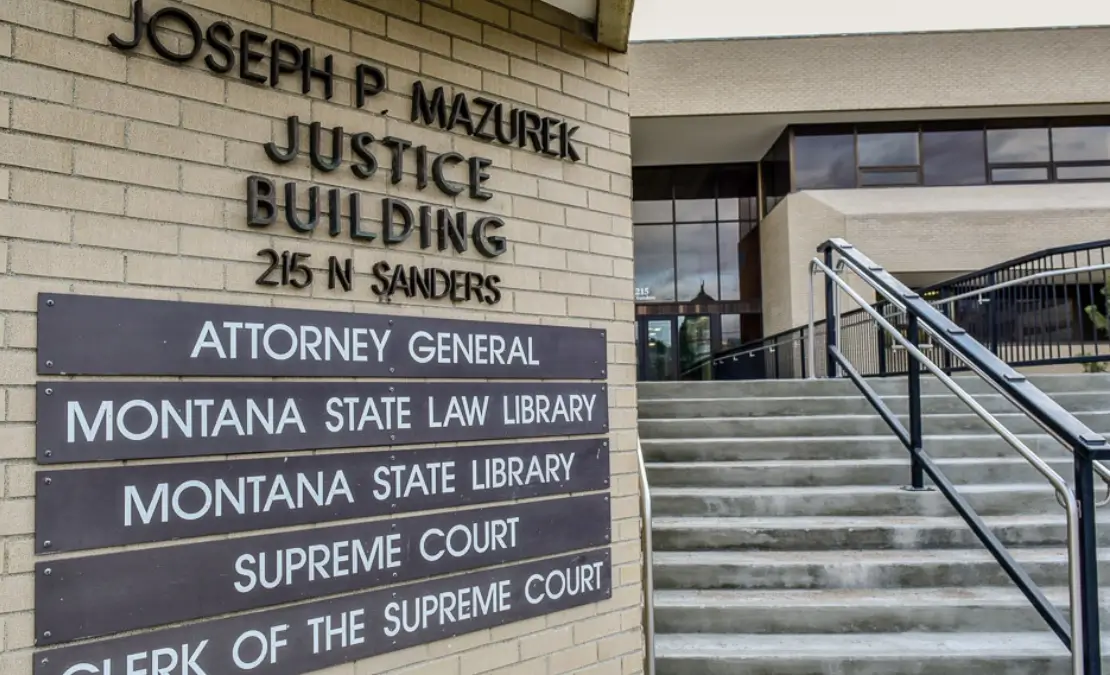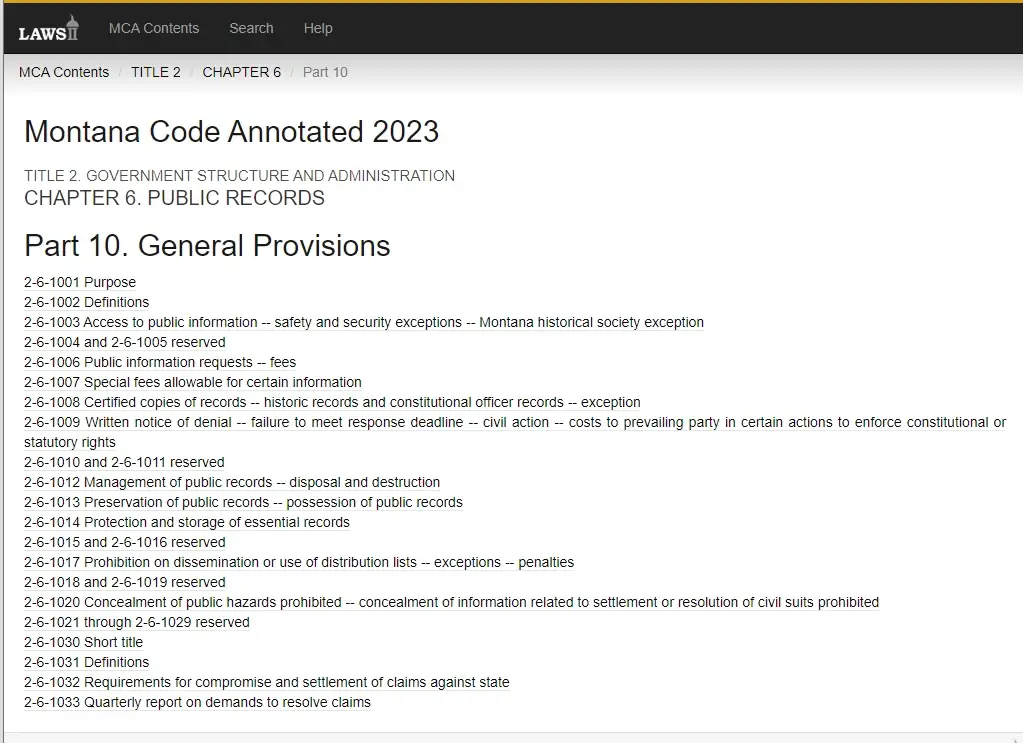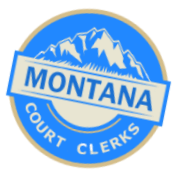How to know if your police report is public record
First, it’s important to know that police reports are public record in Montana, when made available. This means that police reports become public record once a case has been closed or there is no ongoing investigation.
When you need to get a copy of a police report in Montana but are stuck not knowing what agency to contact, or what paperwork to file – no worries. We’re going to walk you through how to file a FOIA request and get the police report you need.
Overview of Montana criminal records search
Montana Criminal Record Search Overview: It’s a search to access a person’s criminal history, bench warrant, and active warrants. Here’s a table of what information most police reports include:
| Type of Case | Court | Access |
|---|---|---|
| Felony | District Court | Public |
| Misdemeanor | Justice Court or Municipal Court | Public |
| Civil Judgments & Lawsuits | District Court or Justice Court or Municipal Department of Justice (DOJ) Violation Records (Traffic Tickets) | Public |
But remember – certain offenses might not show up due to privacy laws. For reliable information, it’s best to seek help from certified agencies like the Montana Department of Justice.
Pro Tip: Detective work starts here!
Types of police reports in Montana
To understand the various types of police reports in Montana and how they are used in criminal record searches, you need to be familiar with incident reports, arrest reports, and accident reports. Each type of report serves a different purpose in criminal justice proceedings. In the following sub-sections, we will delve into the specifics of each type of report and explore its importance in the Montana criminal justice system.
Incident reports
Incident reports, recorded by local police, are a type of documentation for any unusual encounters or unlawful activities. These reports can cover topics like accidents, thefts, assaults, burglaries, and other criminal activity. They include details such as the location and time of the incident, as well as, the names of those involved and how they participated.
City law enforcement agencies in every district in Montana consider incident reports essential for solving cases and providing evidence in court. This means that officers must make sure to include every tiny detail when creating their reports. For example, if an incident occurs on private property, they need to get permission from the owner before taking action. Officers often conduct detailed investigations before creating their reports.
Every incident report is different. Data entry and formatting procedures vary due to legal requirements and agency rules. However, all incident reports must be precise and accurate due to their importance in investigations.
These reports can also help trauma victims receive psychological assistance. They show emotional state changes, like anxiety or depression, which can affect victims greatly.
A famous case in Montana stemmed from an arrest report. Ted Kaczynski was arrested in his cabin near Lincoln after 17 years of postal bombings. 23 people were injured and two people died due to them. The FBI investigated his brother’s home and found concerning information. An investigation team verified his messages with their database of his past writings and arrested him.

Arrest reports
In Montana, the police create arrest records which include the person’s name, address, date of birth, physical description, and details of their arrest. Other police documents are incident reports, accident reports, and traffic violation reports. These help law enforcement keep people safe.
There are strict laws which govern who can access criminal justice info like arrest records. People can’t access juvenile offender records without permission from an authority.
Recently, near Glacier National Park, two hikers got lost in challenging terrains. But, they were quickly rescued by park rangers due to timely reporting procedures by other tourists. The official police reports said they had only suffered from exhaustion.
If you’re looking to learn about accident reports, take a drive through Montana!
Accident reports
In Montana, when a car accident takes place, law enforcement must file a report. This is called a Crash or Collision Report. It includes details like who was involved, the reason for the accident, damage done, and possibly even witnesses’ statements. The officer in charge adds their assessment of what happened. You can request these reports from local law enforcement or the Montana Department of Justice.
Not all car accidents call for Crash or Collision Police Reports. If there is minimal harm, no injuries, and both drivers agree on responsibility, it is not necessary to file a report. Still, drivers should exchange details like driver’s license numbers and insurance info.
If someone is hurt or killed in an accident, you must call 911 or go to your local law enforcement office right away.
The National Highway Traffic Safety Administration (NHTSA) says that motor vehicle accidents cost the US almost $500 billion each year in medical bills and lost productivity. Getting access to police reports in Montana is tricky.
Access to police reports in Montana
To gain access to police reports in Montana, you need to be aware of the Montana Public Records Act and the differences between District Court and Justice Court. However, there are some exceptions to public access you should also keep in mind. Let’s explore these sub-sections and find out how they might affect your Montana criminal records search, including information about criminal records, criminal history, bench warrants and warrants.
Montana Public Records Act
Montana’s laws require disclosure of public records, known as the Montana Public Records Act. Citizens have the right to access government documents, including police reports and criminal history records. Agencies that deny a request without justification must be held accountable.
Agencies must respond to requests within 10 days of receipt. Then, they have 3 working days to approve or deny access and any associated fees. Even if you don’t live in Montana, you can still get public records – as long as certain requirements are met.
Journalists and organizations also use Montana’s openness laws when reporting stories that require public information. Recently, a local newspaper used this law to request reports from the police about a sensitive case that involved officer misconduct. Thanks to this law, the newspaper was able to give objective news.

District Court vs. Justice Court
When we compare Montana’s legal jurisdictions, we can observe the differences between District Court and Justice Court related to accessing police reports. Here’s what you need to know:
| District Court | Justice Court | |
|---|---|---|
| Scope | Major civil cases | Minor criminal & civil issues |
| Police Reports | File a formal request | Public record requests |
Remember that both courts use different laws and regulations. So, to get a certain police report, it is important to distinguish the jurisdiction.
Also, the amount of info available depends on the type of report requested. To make sure you don’t get rejected or delayed, be patient and follow all procedures. To speed up the process, gather relevant data about the case (time and location).
The only exception: if the police report is so embarrassing, it would make an ostrich bury its head in shame.
Exceptions to public access of police reports
In Montana, public access to crime data police reports is limited by state and federal laws. Access can be denied if it threatens investigations, violates personal privacy, or breaks other legal protections. Plus, information that could affect national security or reveal confidential informant identities is not allowed.
Victims and witnesses of crimes can also ask to have their names and personal information removed from police reports. But the public can still view most of the report.
If you’re looking for police reports in Montana, you should first learn about the relevant laws and regulations. If you’re denied access to certain records, you can appeal the decision through the right channels.
It’s also wise to request only the info you need, rather than the whole report. That way, the process will be quicker and you’ll be more likely to get approval. Finally, make sure to follow the correct procedure when requesting police records.
Obtaining a criminal record or history check in Montana
To obtain a criminal record or history check in Montana, you might be wondering where to start. Don’t worry, we’ve got you covered. In order to get started with this task, you can use the Montana Department of Justice website or consider third-party background check services. These sub-sections will provide solutions for your Montana criminal records search, including finding information about bench warrants and warrants from the District Court and Justice Court.
Montana Department of Justice
Montana’s Department of Justice is the agency in charge of helping crime victims, safety, and justice. It supervises law enforcement departments, reviews appeals, and makes sure those with criminal histories stay in line. The Criminal Records Division holds offender records.
If you want police reports, background or criminal history check in Montana, you go to the Bureau of Criminal Investigation. Get the form online, take it to a Fingerprint Center, pay fees, and wait 10 business days for results. BCI double-checks everything before release.
However, sometimes police reports and other records are lost due to age-out laws or disasters. The Montana Department of Justice is still trying to make use of new technology to keep police and court records up-to-date.
MDOJ has been involved in high profile cases regarding law enforcement personnel. These cases show the need for accurate policing that respects freedom ideals.
Want to check your criminal history? You’ll have to hire a background check service and hope they don’t find embarrassing stuff from your past.
Third-party background check services
Third-party services make it easy and fast to access criminal records or history. Here are some of the most credible services in Montana:
| Company Name | Website | Features |
|---|---|---|
| GoodHire | www.goodhire.com/montana-background-checks | User-friendly system. Customizable solutions and helpful customer service. |
| BackgroundChecks.com | www.backgroundchecks.com/coverage/montana-background-checks | Wide range of searches, like national criminal records, sex offender registry, and driving records. |
| Hireright | www.hireright.com/background-checks/montana | Suitable for businesses of all sizes. Fast turnaround times and applicant tracking solutions. |
It’s important to select a trustworthy company that follows federal and state laws for using personal info.
In Montana, employers must get written consent from job candidates before conducting a background check. This includes employment history verification, credit history checks, drug testing, and criminal record searches (if relevant).
The National Employment Law Project says many employers use criminal records to disqualify someone from a job without considering the type of offense, its relation to the job, and how long ago the offense happened. Employers should be fair and inclusive when using the information from police reports.
Don’t miss out on warrants for arrest and bench warrants in Montana! Get the details today!
Bench warrants and warrants for arrest in Montana
To understand how bench warrants and warrants for arrest work in Montana, you need to know what these terms mean and what types of warrants are issued. In order to avoid being caught off guard by an arrest, you should learn how to search for outstanding warrants. However, if you do have a warrant out for your arrest, it’s important to understand the potential consequences. We will cover all of these topics in depth to help you navigate Montana’s criminal justice system and bail bond options.
Definition and types of warrants
Warrants are legal court orders that give law enforcement permission to take action. Montana state has two types – bench and arrest warrants. To understand them, here’s a table:
| Type of Warrant | Definition |
|---|---|
| Bench Warrant | A court order to bring someone to the judge for not following a prior court order. |
| Arrest Warrant | A court order that lets law enforcement arrest someone suspected of a crime. |
Note: Even if no crime is committed, bench warrants can be triggered if someone doesn’t comply with a court order.
To avoid warrants, individuals must obey court orders, attend hearings/appointments, and keep their contact info up-to-date with the court.
If someone suspects they have an outstanding warrant, they should consult a lawyer quickly to know their rights and options.
Finding a warrant in Montana is like a game- but the consequences for losing are way more serious.
How to search for outstanding warrants in Montana
Searching for active warrants in Montana is difficult, but knowing the steps to take can make it easier. Here’s what you need to know:
- Step 1: Access databases with info on Montana arrest warrants. Look online at the Montana Department of Justice Criminal Records and Identification Services website or search engines like Google, using appropriate keywords. Also, go to local law enforcement agencies such as courts or sheriffs’ offices for records related to criminal cases.
- Step 2: Gather personal info about the individual, e.g. full name, DOB, address, and former addresses.
- Step 3: When you have all the info, check with authorities regularly. Records may not always show current arrests.
Be aware that warrant details may change frequently. Search results can include invalidated warrants, so check other sources before making any decisions.
Protect yourself by regularly checking warrant records. This helps you avoid unwanted encounters with the law. Having a Justice court warrant in Montana is like playing hide and seek with the law – only you’re always ‘it’.
Consequences of having a warrant in Montana
If you have a warrant in Montana, it can lead to serious consequences. Skipping court, breaking probation, or doing a new crime can cause an arrest warrant. This may cause issues such as:
- No job opportunities
- Trouble getting a home
- Strain on personal relationships
- Law enforcement could arrest you
- Cancellation of bonds or fines
- Suspension of driver’s license or registration
- Can’t hold public office
- Restricted travel due to extradition requests
- Loss of gun ownership rights
It’s important to seek legal help and take care of the warrant. Ignoring it won’t make it go away. Evading warrants is dangerous because law enforcement will search for you until they find you. Extradition requests can also make it worse.
John Smith’s story is a good example of the risks. He was wanted for crimes in Montana and multiple states. He tried to avoid arrest, but eventually he turned himself in at a police station near his home.
Remember, if you have an outstanding warrant in Montana, ignoring it isn’t an option! It’s also a great idea to contact a Montana criminal lawyer and a local Montana bail bonds company.
Conclusion and final thoughts.
It is evident that public records include police reports and District Court/Justice Court records. In some cases, certain criminal record info may be confidential or restricted. Knowing the difference between bench warrant and warrants is essential.
Staying informed of your criminal history is key. You don’t want to get into trouble in a job interview or other situations. Don’t wait for something drastic like a denied job; start researching police reports in Montana for any criminal records today.
Don’t ignore your criminal record; it can affect housing applications, school enrollments, loan applications, etc. It may seem like a hassle at first, but not knowing what’s behind it could bring negative consequences later. Act now!
Frequently Asked Questions
You have questions of police reports and if they are public record in Montana? We answer these frequently asked questions about public police reports here. If you have a question please contact us and we’ll be sure to post the answer below.
Are police reports public record in Montana?
Yes, in Montana, police reports are considered public record and are available for public access.
How can I search for Montana criminal records?
You can request for Montana criminal records search through the Montana Department of Justice or the local District Court or Justice Court in the county where the offense was committed.
What is a criminal record?
A criminal record is a compilation of a person’s criminal history that includes all of their past arrests, convictions, and other criminal offenses.
What is a bench warrant?
A bench warrant is a type of warrant issued by a judge when a person fails to appear in court for a scheduled court appearance.
Can I search police reports and warrants online?
Yes, you can search for outstanding warrants online through the official website of the Montana state government or the local sheriff’s office in your county.
Can I view my own criminal record in Montana?
Yes, you can request and view your own criminal record in Montana. However, you may need to go through a background check process and provide identification documents to verify your identity.
